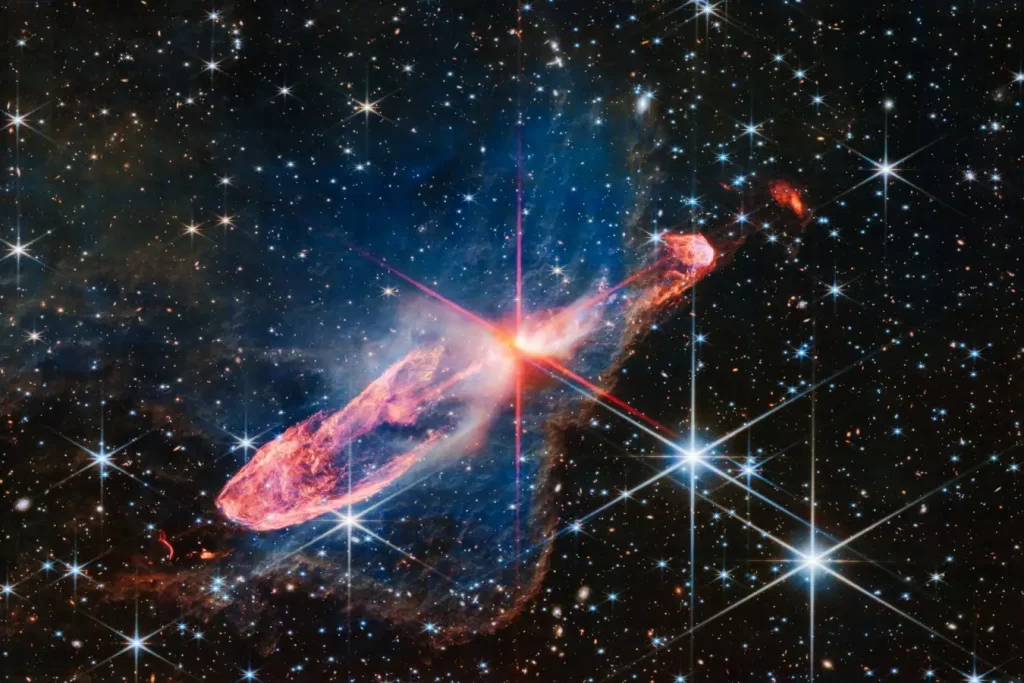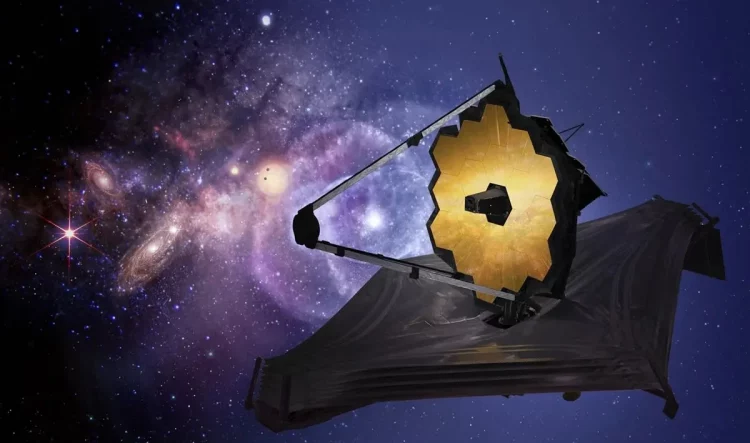Introduction: Introduction to the James Webb Space Telescope (JWST) and Its Mission
The James Webb Space Telescope (JWST) is the most powerful space observatory ever built, a groundbreaking project that promises to unlock some of the deepest mysteries of the universe. Launched on December 25, 2021, the JWST was designed as the successor to the iconic Hubble Space Telescope, which revolutionized our understanding of the cosmos. However, unlike Hubble, which primarily observed in visible and ultraviolet wavelengths, JWST is designed to peer into the universe in the infrared spectrum, a critical capability for observing distant galaxies, nebulae, and exoplanets.
JWST’s mission is to explore the universe’s formation and evolution, investigate the origins of stars, galaxies, and planetary systems, and directly study exoplanets in unprecedented detail. With a mirror 6.5 meters in diameter—nearly three times the size of Hubble’s—it’s poised to provide an unparalleled level of clarity and precision. This article will explore the various ways in which JWST is transforming our understanding of the universe, from capturing unprecedented images of distant galaxies to analyzing the atmospheres of faraway planets.
Unprecedented Imaging: How JWST Captures Distant Galaxies and Nebulae with Higher Clarity
One of the most exciting capabilities of the James Webb Space Telescope is its ability to capture breathtaking, high-resolution images of the universe, far beyond what previous telescopes have been able to achieve. Unlike Hubble, which primarily observed visible and ultraviolet light, JWST focuses on infrared wavelengths, which allows it to look deeper into space and observe objects that are too faint, distant, or obscured by cosmic dust for other telescopes to detect.
The JWST’s infrared capability allows it to penetrate dust clouds in regions like star-forming nebulae, revealing hidden structures of stellar birth and evolution. Additionally, its advanced imaging technology enables it to capture high-resolution images of distant galaxies that formed shortly after the Big Bang. These galaxies, many billions of light-years away, appear as faint, red-shifted smudges to other telescopes. With JWST’s powerful infrared sensors, we can now see these distant galaxies with unprecedented detail, shedding light on the early universe’s formation.
One of the telescope’s most notable features is its 6.5-meter primary mirror, made up of 18 hexagonal segments that work together as one giant reflective surface. This large mirror allows JWST to collect more light and capture clearer images than ever before, enabling scientists to observe faint objects that are invisible to smaller telescopes.
JWST’s ability to produce high-resolution, infrared images is revolutionizing the study of nebulae, galaxies, and the birth of stars—providing new insights into the formation of the universe and the life cycle of stars and galaxies.
Exoplanet Exploration: The Role of JWST in Discovering and Analyzing Distant Planets
The study of exoplanets—planets that orbit stars outside our solar system—has become one of the most exciting frontiers in modern astronomy. While other space telescopes, like NASA’s Kepler, have identified thousands of exoplanets, the James Webb Space Telescope is poised to take this research to the next level.
One of the JWST’s key objectives is to directly observe and analyze the atmospheres of exoplanets, especially those in the “habitable zone,” where conditions might allow liquid water to exist. Using its powerful infrared sensors, JWST can study the composition of exoplanet atmospheres by observing how light from their host stars interacts with the atmosphere as the planet transits in front of the star. This enables scientists to detect the presence of key molecules such as water vapor, carbon dioxide, and methane—elements that could hint at the possibility of life.
In particular, the telescope’s Mid-Infrared Instrument (MIRI) and Near-Infrared Camera (NIRCam) allow for detailed observations of distant worlds that were previously impossible. JWST’s ability to analyze the chemical composition and thermal signatures of exoplanet atmospheres could lead to breakthroughs in the search for life beyond our solar system, giving us a deeper understanding of the conditions required for life to thrive on distant planets.
JWST’s sensitivity to infrared light also allows it to observe planets that are too faint to be detected by visible-light telescopes, opening up new opportunities to study distant exoplanets in greater detail.

Astronomical Discoveries: Early Findings and Breakthroughs from JWST Data
Since its launch, the James Webb Space Telescope has already begun delivering groundbreaking data, revolutionizing our understanding of the cosmos. While it is still early in the mission, the initial findings from JWST promise to reshape our knowledge of the universe.
One of JWST’s most important achievements thus far is its ability to capture the most distant galaxies ever observed. These galaxies, formed just a few hundred million years after the Big Bang, provide a unique snapshot of the early universe. By studying the light from these distant galaxies, astronomers can gain insights into the formation of the first stars and galaxies, helping to answer long-standing questions about the evolution of the universe.
Additionally, JWST has provided new images of famous nebulae, such as the Carina Nebula, in extraordinary detail. These images reveal intricate structures of gas and dust where new stars are being born, offering a detailed look at stellar formation processes that were previously hidden from view.
Another early discovery is the detection of chemical compositions in the atmospheres of exoplanets, providing the first real data on their potential habitability. JWST’s ability to study distant worlds in such detail marks a significant milestone in the search for life beyond Earth.
As more data is gathered, JWST is expected to contribute to a wide range of scientific fields, from dark matter and dark energy to the study of the most distant corners of the observable universe.
Future Missions: What Comes Next for JWST as It Expands Our Understanding of the Cosmos
While the James Webb Space Telescope has already made remarkable contributions to astronomy, its mission is just beginning. Over the next decade, JWST will continue to observe a vast array of astronomical phenomena, helping scientists to address some of the universe’s most fundamental questions.
One of the major future goals of JWST is to better understand the formation of the first galaxies and the early universe. By studying the light from distant galaxies, JWST will help to map out the evolution of these cosmic structures and provide insight into how the universe transitioned from the “dark ages” following the Big Bang to the rich and varied cosmos we see today.
Another exciting area of future research involves the detailed study of exoplanets. JWST is set to revolutionize the search for life beyond Earth by providing unprecedented insights into the atmospheres of distant worlds. As the telescope continues to monitor these planets, it may uncover more signs of habitability and potential life-supporting environments.
JWST will also play a crucial role in studying cosmic phenomena like supermassive black holes, star formation, and the structure of the universe itself. By observing the infrared universe, JWST will offer new ways to probe the mysteries of dark matter and dark energy, which make up the vast majority of the cosmos but remain elusive.
Conclusion: The Transformative Power of JWST in Modern Astronomy
The James Webb Space Telescope represents a monumental leap in our quest to understand the universe. With its advanced infrared capabilities, powerful instruments, and ability to peer deeper into space than ever before, JWST is poised to redefine how we study everything from distant galaxies to the potential for life on exoplanets.
As JWST continues to reveal new astronomical discoveries and push the boundaries of our knowledge, it will undoubtedly shape the future of space exploration and astronomy for decades to come. The telescope’s contributions promise to illuminate the origins of the universe, the formation of stars and galaxies, and the potential for life beyond Earth, forever changing how we view our place in the cosmos.
The James Webb Space Telescope is not just a tool for astronomers; it is a symbol of human curiosity and the relentless pursuit of knowledge. Its findings will inspire future generations of scientists, researchers, and dreamers to continue exploring the vastness of space and unlocking the mysteries of the universe.











































Discussion about this post